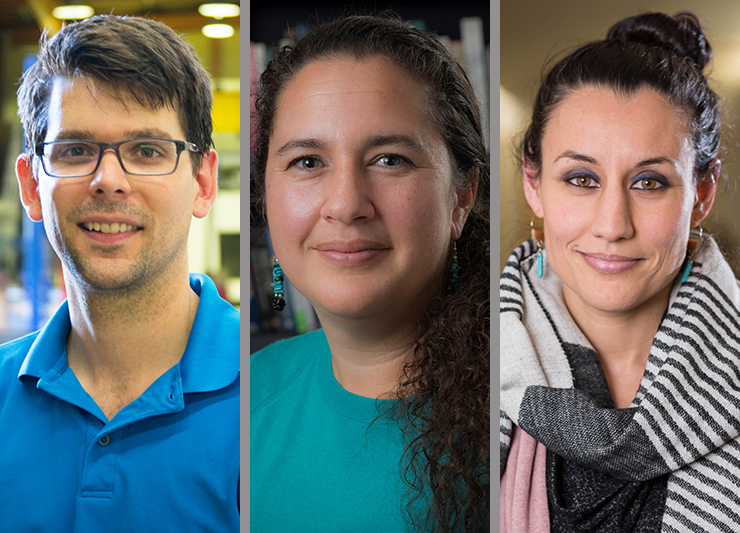James Hambleton, Megan Bang and Shirin Vossoughi have been named the 2019 recipients of The Alumnae of Northwestern University’s Award for Curriculum Development.
The awards, administered by the Office of the Provost, provide $12,500 to each professor to support the development of innovative course materials and new modes of teaching.
Hambleton, an assistant professor of civil and environmental engineering in the McCormick School of Engineering and Applied Science, will develop a teaching module that supports and enhances an existing first-year engineering course and includes experiential learning activities aimed at improving student engagement and performance.
Bang and Vossoughi, professor and assistant professor, respectively, in the School of Education and Social Policy (SESP), plan to develop a pilot collaborative course with Evanston Township High School (ETHS) that investigate issues of social justice within the education system.
With a focus on active learning, critical thinking and the development of relevant skills, each professor’s projects will prepare students for greater success within and outside of their disciplines. Each project embodies the innovation that is paramount for recipients of The Alumnae Award for Curriculum Development, helping to grow and strengthen the undergraduate curriculum at Northwestern in creative ways.
Inspiring first-year engineering students to enjoy basic mechanics
Hambleton will develop an optional module for first-year students taken concurrently with Engineering Analysis 2, a required course. Hands-on activities, friendly competitions and in-depth discussion of real-world examples will inspire and engage students and reinforce core course content.
During the first half of the course, Hambleton will draw from his own research on how soils are moved and shaped through interaction with man-made objects. Student teams will design and build a “boring machine,” which will be tested in the new Soil-Structure and Soil-Machine Interaction Laboratory. In developing their own designs, students will be encouraged to look at bio-inspired machine designs, examining how worms, insects, clams and plant roots burrow through soil.
For the second group activity, students will design, build and test a 3D-printed truss, making use of 3D printers in on-campus maker spaces. They also will examine and discuss the mechanics involved in prominent bridge failures.
Both activities will culminate in competitions between student groups, with prizes awarded to the best-performing models and to those employing the most innovative design concepts.
Hambleton noted that education research identifies hands-on activities as a means of retaining engineering students, and the course provides an innovative and rigorous pedagogy to address the knowledge gap that can exist between first-year engineering students.
Hambleton joined the Northwestern faculty in Fall 2016 and has gained recognition as a skilled and dedicated teacher. In her letter of support, department chair Kimberly Gray noted that Hambleton is a “superior communicator” with an “infectious exuberance for engineering.”
Hambleton’s award will fund the purchase of supplies and equipment for the pilot offering of the course, the hiring of undergraduate teaching assistants and prize money for the winning groups. Close work with the undergraduate assistants, who will serve as mentors for the first-year students, will be another course benefit.
Connecting students and the broader community through hybrid courses
Bang and Vossoughi will design a hybrid course that brings together Northwestern students with young people and community members outside the University to investigate issues of social justice within the education system. Their award will fund the development of a pilot course for Northwestern undergraduates and students at ETHS, including an innovative apprenticeship in community-based research.
The initial hybrid course offering -- co-taught by Vossoughi, Bang and an ETHS teacher -- will focus on educational justice. Students will examine histories of educational inequity and design and carry out community-based research projects on local educational struggles. They will move beyond summarizing key arguments found in course texts toward engaging evidence-based analysis and argumentation with the goal of integrating theory, research and social action. The course will foster the development of students as publicly engaged scholars and writers.
As SESP Dean David Figlio noted in his letter of support, the proposed course also “directly furthers our efforts to ensure that SESP is at the cutting edge of undergraduate pedagogy, and enhances our research and teaching missions in collaboration with and in service to our local communities.”
Bang, a 2009 SESP doctoral alum, and Vossoughi both have personal experience teaching high school students. Bang has studied STEAM (STEM plus Arts) learning among K-12 Indigenous youth and has examined differences among rural Native American, urban Native American and urban non-Native American preschoolers in their approaches to play with a forest diorama. Vossoughi, who completed postdoctoral work at Stanford University and the San Francisco Exploratorium, has studied culture, equity and learning in after-school tinkering and making programs and has helped design summer institutes organized around expansive forms of reading, writing and social analysis.
Their award will fund collaborative summer work on course design by Vossoughi and Bang, one or two ETHS teachers and students from both Northwestern and ETHS. It also will provide funds for compensating community partners, elders and local organizers who engage with students during the first offering of the course.
The Alumnae of Northwestern University is an all-volunteer organization of women that raises funds for a wide range of projects to benefit the University and also shares the University's academic resources with the community through its Continuing Education program. Founded in 1916, The Alumnae has given more than $8 million to the University in the form of grants, fellowships, scholarships and an endowed professorship. It also has provided funds for special University projects and summer internships.


